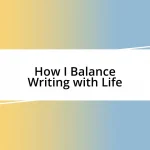Key takeaways:
- Literary influences shape writing styles and emotional connections, guiding personal and creative growth through the exploration of different genres and authors.
- Identifying personal values becomes essential in selecting literary works that resonate with the writer’s beliefs, fostering a deeper engagement with themes like social justice and identity.
- Incorporating diverse writing styles and thematic relevance enhances narrative voice, encouraging experimentation and reflection on historical context and personal experiences within storytelling.
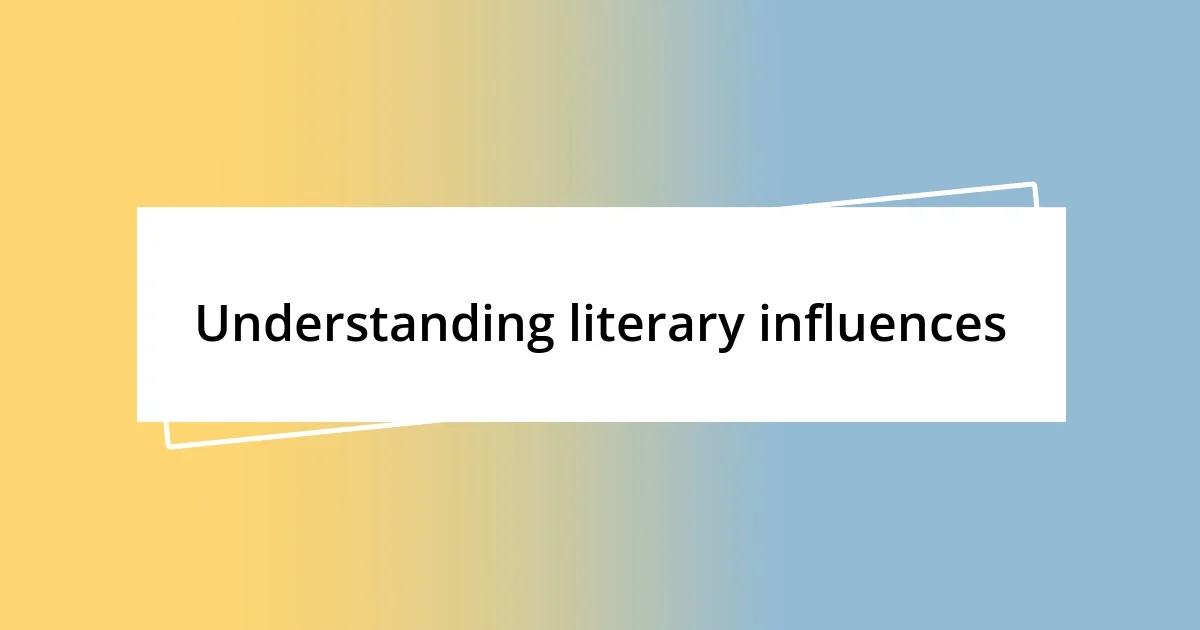
Understanding literary influences
Understanding literary influences is truly about recognizing the voices that shape our writing style and thought processes. I remember the first time I read Virginia Woolf—her stream-of-consciousness technique opened my eyes to how fluid language can transform a narrative. Have you ever felt that spark when a single author completely shifts your perspective on storytelling?
Literary influences often stem from our unique experiences and the contexts we find ourselves in. For instance, I often reflect on how my love for magical realism, especially in the works of Gabriel García Márquez, connects with my fascination for the extraordinary in everyday life. This blend of reality and fantasy profoundly affects how I construct my own stories, inviting readers into a world that feels both familiar and oddly enchanting.
Moreover, understanding these influences helps us identify what resonates with our individual creativity. When I dive into poetry, I feel a sense of liberation; it strips away the excess and lays bare raw emotion, much like reading Rainer Maria Rilke. Do you find certain genres or authors evoke feelings that you can’t quite explain? That emotional connection is vital—it fuels our passion for writing and informs the stories we are drawn to tell.

Identifying personal values
Identifying personal values is a journey into understanding what matters most to us, especially as writers. I often find that my core values shape the types of stories I gravitate towards. For example, my commitment to social justice and empathy draws me to authors like Chimamanda Ngozi Adichie, whose narratives challenge societal norms and evoke deep reflection. Have you ever paused to think about how your beliefs impact your reading choices?
When I explore different literary works, I consciously seek out themes that resonate with my values. I remember reading “The Hate U Give” by Angie Thomas and feeling a strong connection to the theme of race and identity. It’s moments like these that reinforce my belief in the power of literature to promote understanding and change. It’s as if the narrative echoes my own thoughts and feelings—reminding me why I write in the first place.
Moreover, identifying personal values provides guidance when selecting literary influences. I often reflect on the joys of tradition and cultural heritage, which lead me to nurture my admiration for authors who celebrate their roots. Authors who weave their backgrounds into their narratives, like Zadie Smith, inspire me to embrace my own history and how it informs my literary voice. This connection between my values and the literature I consume enriches my writing process and fuels my creativity.
| Value | Literary Influence |
|---|---|
| Social Justice | Chimamanda Ngozi Adichie |
| Race and Identity | Angie Thomas |
| Cultural Heritage | Zadie Smith |
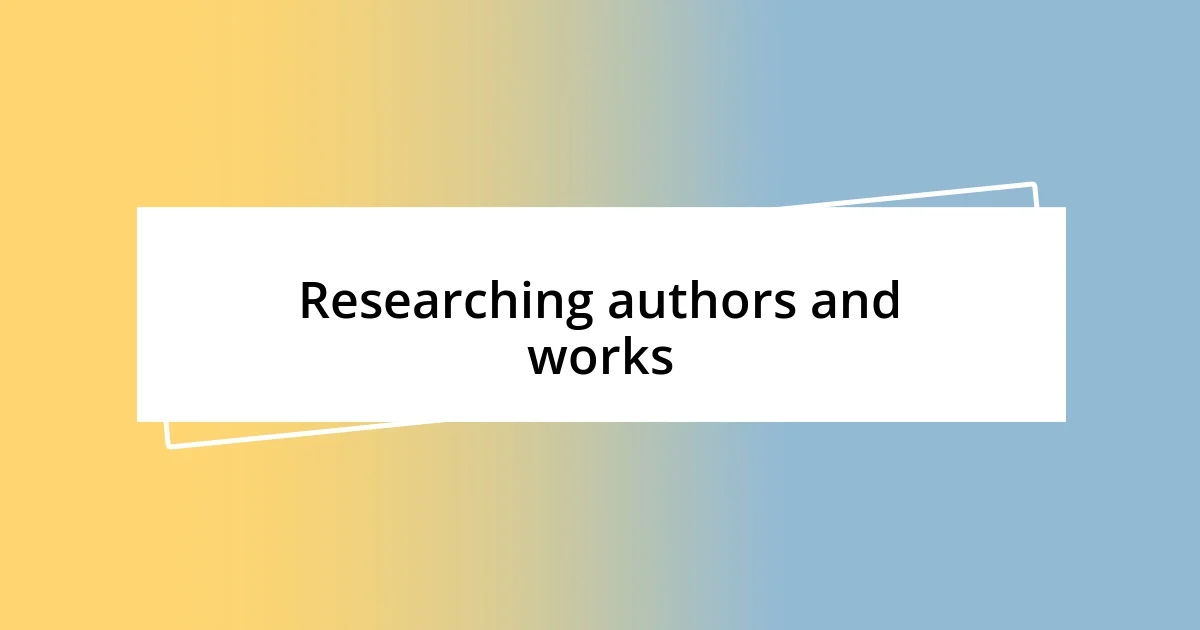
Researching authors and works
Researching authors and their works is an exhilarating journey that opens doors to new worlds and perspectives. I often start my exploration by seeking out the background of an author’s life—understanding their experiences can shed light on their narratives. For example, when diving into the works of Toni Morrison, I was struck not only by her lyrical prose but also by how her upbringing and cultural influences deeply informed her storytelling. It’s like peeling back layers of an onion; each layer reveals something profound about the author and their motivations.
To streamline my research, here are a few strategies that I find particularly helpful:
- Read Author Interviews: Hearing an author’s thoughts directly can illuminate their intentions and the themes they weave into their work.
- Explore Literary Criticism: Engaging with critiques helps me see various interpretations, enhancing my understanding of the text.
- Utilize Online Databases: Websites like JSTOR and Goodreads are fantastic for finding scholarly articles or reader reviews that provide insight into an author’s impact.
- Attend Literary Festivals: These gatherings often feature discussions with authors that can enrich my understanding of their works in an engaging manner.
- Join a Book Club: Sharing thoughts and analyses with fellow readers often unveils perspectives I hadn’t considered.
By immersing myself in the lives of authors, I not only enrich my reading experience but also refine my own writing style. Letting these influences flow into my work fosters a connection that feels both personal and transformative.

Analyzing writing styles
Analyzing writing styles is where the magic truly begins for me. When I delve into a work, I ask myself, “What unique choices is the author making?” I remember reading a passage from Haruki Murakami that captivated me not just for its content, but for its rhythm and flow. His knack for blending the surreal with the mundane feels like a dance, inviting me to explore the world through his lens. Have you ever noticed how a single author’s sentence structure can transport you?
I often compare writing styles to different flavors in a meal. Some authors, like Ernest Hemingway, serve up a sparse, straightforward approach that feels like a well-seasoned dish, while others, like Gabriel García Márquez, create rich, layered prose that essentially explodes with flavor. This contrast energizes my own writing, pushing me to explore how I can incorporate brevity one moment and lush detail the next. When I try to emulate these diverse styles, I keep asking myself, “How can I bring this sense of rhythm or depth into my own work?”
Experimenting with different styles has been a revelation in my writing journey. I remember attempting a piece inspired by Ray Bradbury, where I focused on sensory details to evoke emotion. The exercise changed how I view my own narratives. Each author I analyze teaches me something new about technique, voice, and emotional depth. I can’t help but feel a sense of excitement when I think of the vast array of styles out there, each waiting for me to unwrap and incorporate into my own voice as a writer. What styles resonate with you? How do they shape the way you express your thoughts on the page?

Evaluating thematic relevance
Evaluating thematic relevance is an aspect of literature that greatly influences my selection of literary influences. I often reflect on the resonance of a theme within my own life experiences. For instance, upon reading Jean-Paul Sartre, I was intrigued by his exploration of existentialism. His inquiries into freedom and responsibility struck a chord with my own quest for meaning. I couldn’t help but ask myself, “How does the search for identity reflect in my own narrative?” This connection solidified my appreciation of his work and its power to provoke self-reflection.
Moreover, I find it invaluable to consider how a theme interacts with societal issues. When I explored Zadie Smith’s writing, I was particularly drawn to her nuanced discussions of race and belonging. Her adeptness at weaving complex characters navigating these themes made her work feel incredibly relevant to contemporary discourse. It was like holding up a mirror to the world we live in today, prompting me to think critically about how these issues shape my own perspectives. I often wonder, “What can I learn from these themes to enrich my own writing?”
Lastly, I’m constantly reminded that themes can be fluid and evolve over time. Revisiting classics like F. Scott Fitzgerald’s The Great Gatsby offers fresh insights each time, as societal values transform. I recall my initial reading as a teenager, where I saw the glitzy allure of the American Dream, only to later recognize the deeper commentary on disillusionment as an adult. This evolution in understanding reinforces the importance of thematic relevance in my literary choices. How have your own interpretations of themes changed over time?
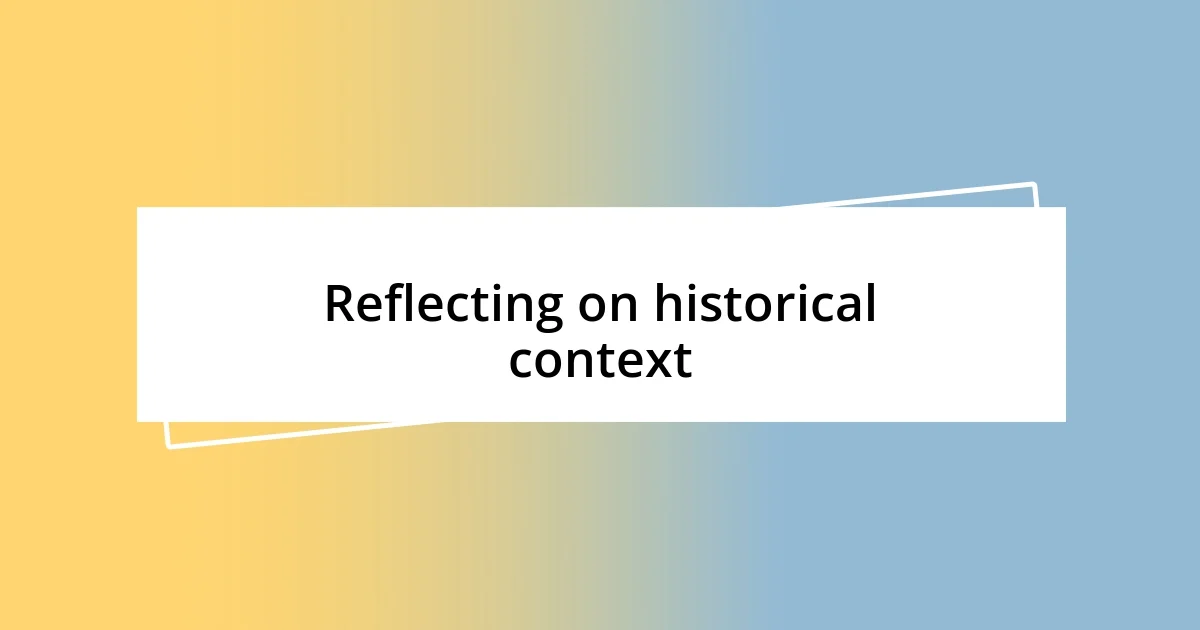
Reflecting on historical context
Reflecting on historical context is crucial when choosing literary influences, as it adds layers to understanding a work. I remember reading To Kill a Mockingbird and feeling deeply moved by Harper Lee’s portrayal of racial injustice in the Jim Crow South. This backdrop not only heightened my awareness of the issues but made me realize how historical struggles shape our current societal conversations. Don’t you find it fascinating how the past informs the present in literature?
Moreover, I often think about how the political climates of different eras affect themes and styles. For instance, during my exploration of Virginia Woolf’s work, I was struck by how her modernist approach was a direct response to the tumult of World War I and the shifting roles of women. It was like uncovering a dialogue between the author and her time, prompting me to consider how my own writing reflects contemporary challenges. Can you recall a piece that felt intricately tied to its historical moment?
Sometimes, historical context also deepens my connection to character motivations. When I read Toni Morrison, I couldn’t help but feel the weight of African American history in her characters’ lives, which made their struggles and triumphs profoundly relatable. Each page revealed how the legacies of the past inform personal identities today, and it made me reflect on my own background. How does understanding the history behind a character enrich your experience of the story?
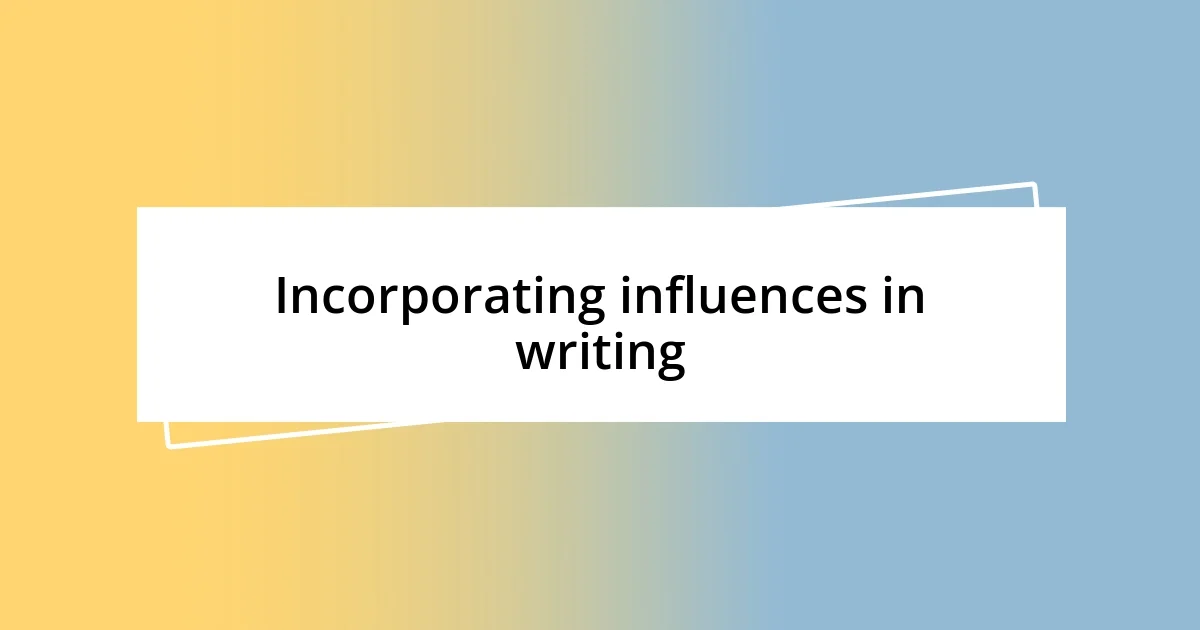
Incorporating influences in writing
Incorporating influences into my writing is an exciting journey that enriches my narrative voice. When I first encountered Gabriel García Márquez’s magical realism, it completely transformed my perception of storytelling. I remember attempting to weave the surreal into my own narratives, drawing readers into a world where the extraordinary becomes ordinary. Have you ever found a specific style that inspired you to break traditional boundaries?
I often think about the way certain authors craft their prose, and I try to emulate what resonates with me. For example, I’ve always admired Ray Bradbury’s lyrical quality. His vivid imagery takes readers on a sensory experience that I aspire to replicate in my own writing. I remember feeling a jolt of inspiration while reading The Martian Chronicles, thinking, “How can I infuse more sensory details into my own scenes?” This connection not only helped me shape my writing style but also pushed me to delve deeper into my characters’ experiences.
Embracing various literary influences isn’t just about imitation; it’s about transformation. I distinctly recall experimenting with the fragmented narrative style of David Foster Wallace in one of my projects. While it was challenging, the process taught me the power of non-linear storytelling to mirror complex thoughts. As I navigated through my characters’ psyches, I realized how this technique could evoke a deeper connection with readers. Have you ever tried adopting a different narrative structure, and what was the outcome for you?














